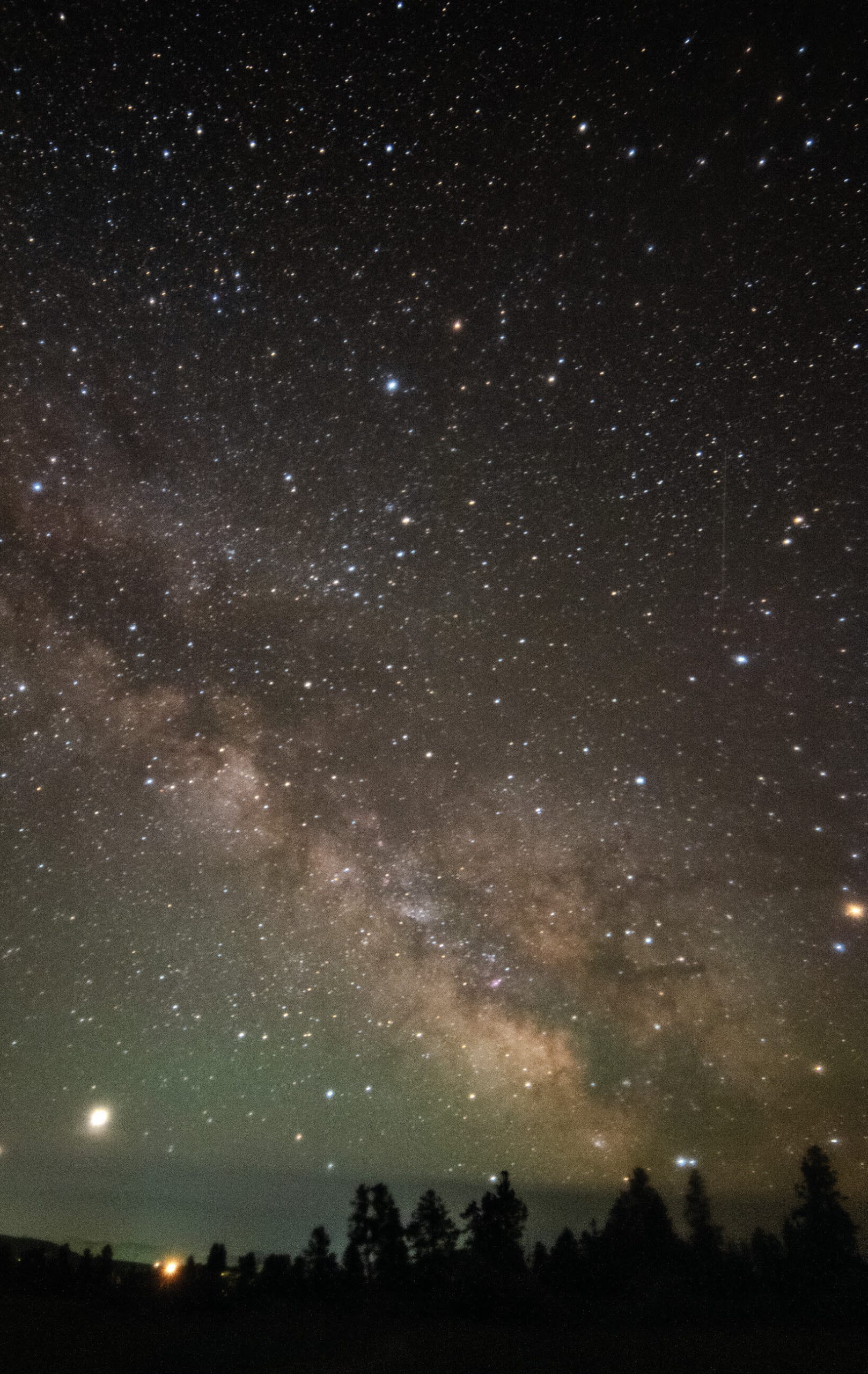
27 May Local Knowledge: Looking Up
As a young boy, Samuel Singer spent a lot of time looking up at the night sky with his dad near their home in northern Nevada’s high desert. They had relocated from a more urban environment, and the young Singer was captivated by the night sky. “I moved from a place where I could only see the moon to a place where there were thousands of stars above my head,” Singer says. “My dad had a fascination with the night sky, and he would take me out to watch meteor showers. I remember seeing some lunar eclipses with him and looking at Comet Hale-Bopp.”
His dad bought him a small telescope, through which he could see Saturn’s rings, craters on the moon, and even the moons of Jupiter. These early experiences fostered a lifelong love of the universe, leading Singer to marry his vocation and passion as the executive director of Wyoming Stargazing, a Jackson, Wyoming-based nonprofit he founded over a decade ago.
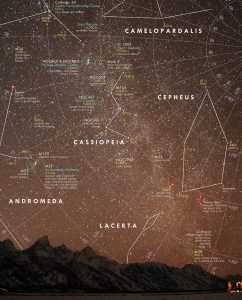
This image of the winter night sky over the Tetons features a digital overlay showing the positions of the constellations and the coordinate system of the sky.
In high school, Singer signed up for an astronomy class, and his teacher soon recognized his passion for the night sky. “[He] noticed that I had a spark and decided he wanted to help cultivate it,” Singer says. A friend joined Singer in becoming a teacher’s aide the following year, but rather than performing typical tasks, their teacher encouraged them to focus their efforts on constructing a telescope from the kit Singer’s parents had given him. Under the teacher’s guidance, the eager young astronomers learned how to grind telescope mirrors and assemble the scope.
When he went to Hampshire College in Amherst, Massachusetts the following year, Singer brought his telescope along. The university didn’t have an observatory or telescope at the time, but it had just hired its first astronomer in 20 years. The astronomy professor heard about Singer’s 7-foot-tall telescope with 14.5-inch mirrors and asked him to bring it to class. He also encouraged Singer to sign up for his class the following semester. Singer did, and he eventually switched the focus of his studies from jazz music and creative writing to physics and astronomy. As part of his thesis project, he worked with the school to build a small observatory, spending many hours working in the machine shop and optics lab to build the telescopes.
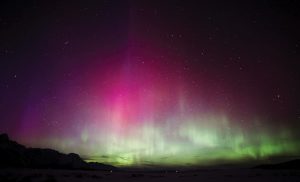
The Northern Lights can sometimes be seen in Jackson Hole, including this spectacular show several years ago.
Sadly, someone stole the main telescope, which, in a cosmic coincidence, was on the same night Singer finished building an observatory at Teton Science Schools’ Kelly Campus in Jackson. Singer attended a graduate program there in 2005 and was on the graduate faculty from 2008 to 2009, focusing on his dual passions for outdoor education and astronomy. The school had a couple of old telescopes, so he put together a small observatory in a bully barn with a roll-off roof. He used the facility to host dozens of astronomy programs for visiting schools.
During his time at Teton Science Schools, where he earned his master’s degree in environmental education, Singer started envisioning a way to return to Jackson and stargaze. “I realized what a special place this was for stargazing, and it was really reminiscent of the skies that I saw during my childhood with my dad. … I had an idea in my head that it would be great if I could land back in Jackson teaching astronomy someday.”
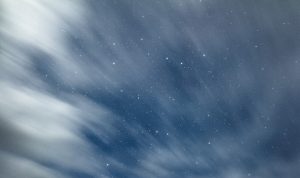
A few stars peek through the clouds on a moonlit night in Jackson Hole.
He went to the University of Wyoming in Laramie for his doctorate, completing a dissertation that focused on spirituality in outdoor environmental education. Today, Singer is also a mindfulness facilitator.
“The outdoors have always been the place I go for solace … for me, it started with my dad and I sitting out under a night sky just being quiet,” Singer says. “And, quite frankly, that was my original interest in astronomy. It was not about learning the facts about astronomy; it was about feeling a connection with something larger than me.”
In 2013, Singer finished his doctorate in science education, but he knew he didn’t want to go into academia. He spent a summer working at an outdoor program in Sheridan, Wyoming, where he stayed in a camper parked in the backyard belonging to his friend and mentor. One night over dinner, he had a transformative realization when his friend asked him what he wanted to do in his “heart of hearts,” if he could do anything, starting the next month. Singer replied that he would love to move back to Jackson and teach people about the night sky. Encouraged, and with the help of his friend, Singer established a nonprofit.
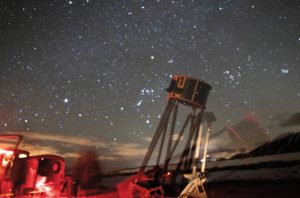
A 30-second exposure of the constellation Orion and accompanying stars captured one of Wyoming Stargazing’s telescopes in motion.
Singer soon moved back to Jackson with his newly formed nonprofit and began offering free monthly stargazing programs. First, just a few friends showed up, but before long, hotel concierges came to see what it was all about and asked if Singer would host private events for their guests. Soon, Wyoming Stargazing came to life, and Singer worked with Jackson locals interested in astronomy and physics to design a website, logo, and programming.
When he established the nonprofit in 2013, Singer worked as the part-time executive director while he maintained full-time employment in a variety of other education-related fields, working as wildlife tour guide, preschool teacher, and after-school program tutor. Then, the 2017 total solar eclipse came through Jackson, bringing huge crowds from around the globe. “It couldn’t have happened at a better time for the organization,” Singer says. “We were just getting big enough to actually be able to do something. We went from being known within a 20-mile radius to being recognized across the globe with people who wanted to come to Jackson for the total solar eclipse.” As the organization grew, Singer shifted his position to full-time, and he’s been able to maintain that role ever since.
With lots of public land, low population density, and very dark skies, Jackson is an ideal place for Singer to stargaze and teach people about the night sky. “Just having all that undeveloped land makes the night sky really beautiful,” he says. “And then you couple that with high elevation and low humidity, and you’ve got a great recipe for stargazing. High elevation is good because you’re looking through less atmosphere compared to sea level, and low humidity is good because water vapor in the atmosphere causes turbulence as light passes through it. So the fact that we’ve got a fairly dry atmosphere through most of the year makes the stargazing that much better.”
Each year, millions of tourists come through Jackson, meaning plenty of stargazers are eager to sign up for Wyoming Stargazing’s variety of programs. The organization employs around 10 stargazing leaders each summer, though the number of employees shrinks to around half a dozen in the winter. “Stargazing kind of drops off in the wintertime. It turns out it’s way harder to convince people to stand outside when it’s really cold,” Singer says with a laugh.
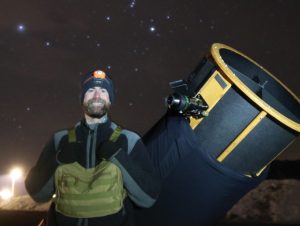
Samuel Singer is the executive director of Jackson-based nonprofit Wyoming Stargazing, which he founded in 2013.
However, the nonprofit still keeps people employed year-round through a cooperative program with the local school district. When programming slows in the winter, the employees instead work with local middle and high school students, tutoring them in math, science, reading, writing, and SAT preparation. A variety of sources fund the program, including grants through the school district, the local community foundation, and private donors.
“I’m really excited about the education work that we’re doing,” Singer says. “I’ve always been an educator, and it’s really important for me to use whatever leverage I have to help more and more people learn about the sciences and have access to the same types of opportunities that I had.”
Singer is also working with the local community to protect Jackson’s dark skies through the Save Our Night Skies campaign, which involves a variety of measures, including achieving Dark Sky Community Certification. Recently, Singer helped Teton County, the town of Jackson, and Jackson Hole Airport earn Dark Sky certification, an achievement he’s worked toward for more than 10 years. “A lot has changed in a decade; there’s been a lot more awareness about the night sky — way beyond the work that I’ve done. There are many more people thinking about the night sky in terms of tourism, in terms of it being a natural resource,” he says.
As dark-sky tourism grows and more people become interested in telescopic views, Singer and his team are eager to help them find the same wonder that he first experienced in the high desert of Nevada with his dad — looking up into the universe.
Kristen Pope is a freelance writer and editor who covers stories about mountain living, science, conservation, travel, and the outdoors for a number of outlets; kepope.com.



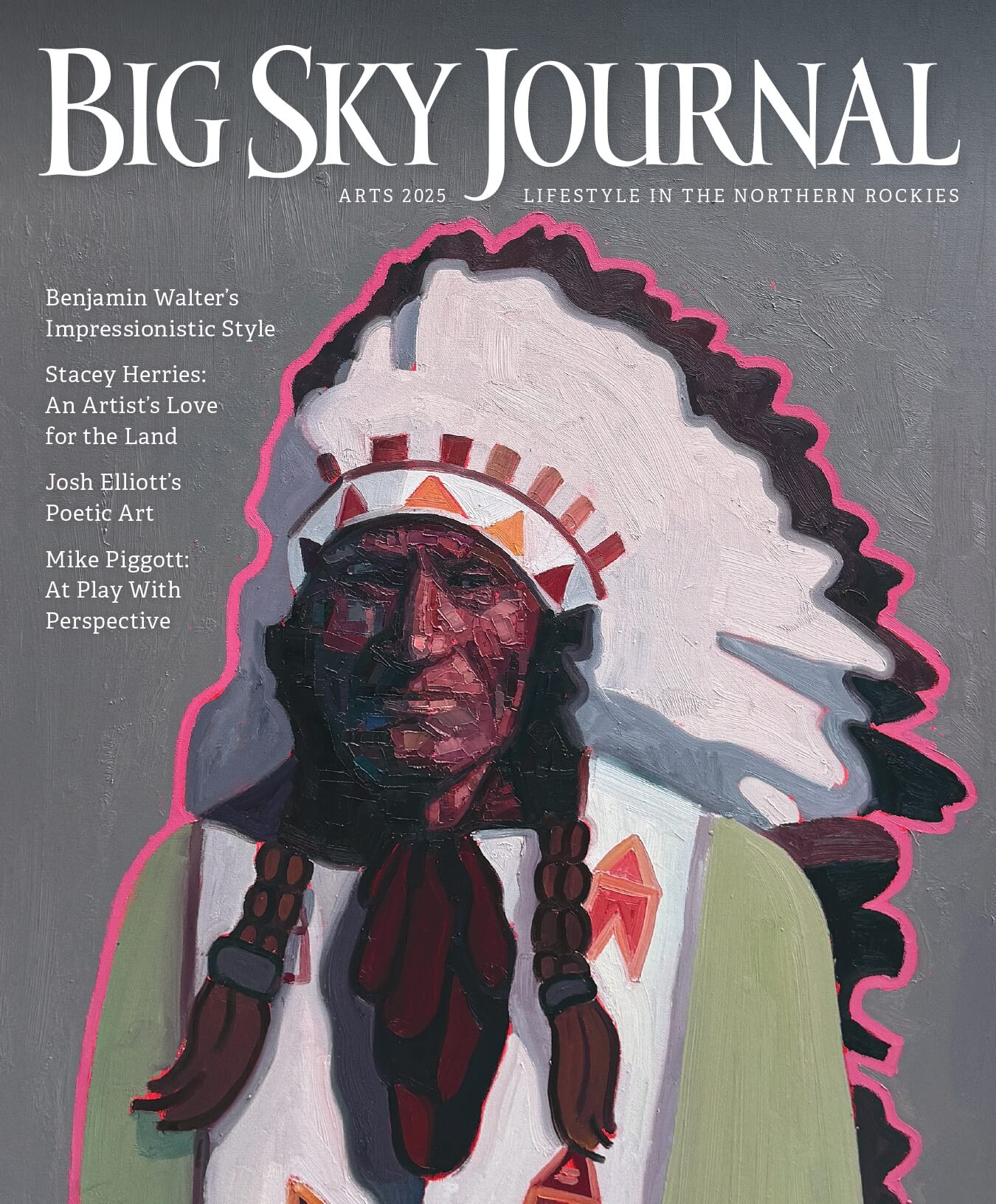
No Comments